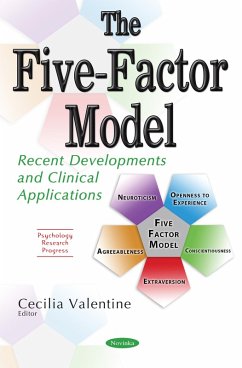Personality traits are enduring dispositional tendencies commonly defined as "e;dimensions of individual differences in tendencies to show consistent patterns of thoughts, feelings, and actions"e; (McCrae and Costa, 2003, p. 25). The broad consensus within the personality literature is that normal or general personality traits can be organised around five higher-order dimensions (John, Naumann, and Soto, 2008). These five personality dimensions are Neuroticism, Extraversion, Openness to Experience (Openness), Agreeableness and Conscientiousness and they collectively constitute the Five-Factor Model (FFM) of personality structure (McCrae, 2009). This book discusses recent developments and clinical applications of the FFM. Chapter One analyzes five types of personality continuity in three samples of adolescents. Chapter Two explains the personality variables included in the Five Factors Model that influence the negotiation process, with a set of studies that seeks to relate the personality factors included in the model, jointly or partially, with the behaviours displayed by the subjects' negotiators, seeking, thus, to systematize the theme under review. Chapter Three firstly provides an overview of recent developments about FFM traits and personality pathology and, secondly, it presents a research study that explored the relationships between these personality characteristics. Chapter Four examines early maladaptive schemas and dysfunctional beliefs associated with personality disorders in relation to the FFM.
Dieser Download kann aus rechtlichen Gründen nur mit Rechnungsadresse in A, B, BG, CY, CZ, D, DK, EW, E, FIN, F, GR, HR, H, IRL, I, LT, L, LR, M, NL, PL, P, R, S, SLO, SK ausgeliefert werden.









